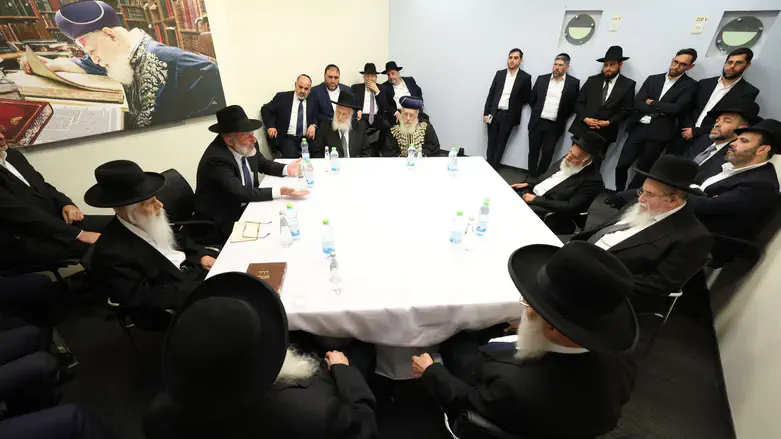
The Shas Party's Council of Torah Sages decided on Wednesday that the party would resign from the government but not leave the coalition.
Currently, Shas's Knesset members will not support a no-confidence motion against the government, which would allow the Prime Minister to continue his efforts to advance the draft exemption law.
At the same time, the MKs were instructed to hold on to their positions in Knesset committees.
According to party officials, the decision aims to send a clear message about the importance the draft exemption law holds for Shas, without immediately toppling the government.
Minister of Religious Affairs Michael Malkieli stated following the meeting that the decision comes on the background of the "persecution" of Torah students. "In the current situation, we can not sit in the government and be part of it. Shas will not work against the coalition, we will not join forces with the left."
Earlier in the week, the factions making up the United Torah Judaism (UTJ) list, Degel Hatorah and Agudat Yisrael, which represent the Ashkenazi haredi community, announced their departure from the government, with their members resigning from ministerial and committee positions.
At the heart of the crisis that led United Torah Judaism to withdraw from the coalition was a fundamental disagreement over how to monitor yeshiva students.
The most contentious issue was the demand by Foreign Affairs and Defense Committee Chairman Yuli Edelstein to install biometric systems at the entrances of study halls.
These devices were intended to record the daily attendance of Torah scholars who receive a draft exemption under the "Torato Omanuto" (Torah is his profession) status. The goal was to ensure that those benefiting from the exemption were indeed fulfilling their commitment to full-time yeshiva study.
Representatives of the haredi parties viewed this demand as a severe infringement on the independence of the yeshiva world. In their eyes, it constituted the imposition of a state oversight mechanism on religious institutions that have operated autonomously for centuries.
Edelstein, while acknowledging the opposition, remained firm on the need for enforcement. He offered to hear alternative proposals from Haredi representatives, clarifying that while he was open to any solution that would ensure effective monitoring of attendance, he would not compromise on the principle of oversight itself.
